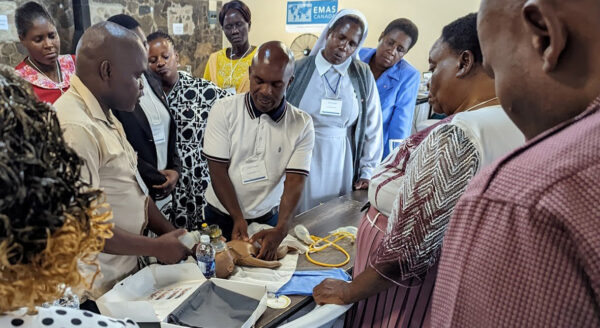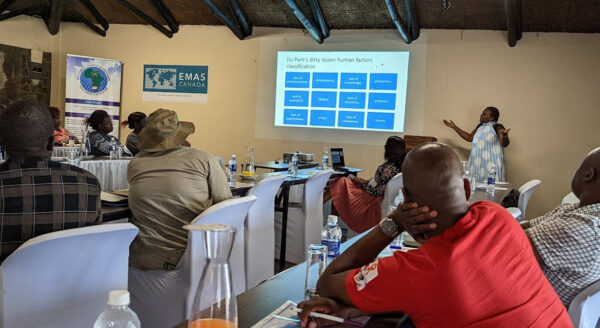On the day after arriving in Harare, I met over brunch with the Moderator of RCZ and the local infrastructure team that has been working on the initial design for a new maternity unit at Gutu Mission Hospital (GMH). After a year of video conference calls, meeting in person was an important step from acquaintance to friendship.

Some members of the GMH infrastructure technical design team. L-R: Gedion Mukorombindo Quantity Surveyor, Dr. Peter Agwa, Rev Pandasvika (RCZ Moderator), Solomon Madondo Team Chair (standing), Claudius Kurauvone Architect, and Raymond Musungwa Monitoring and Evaluation. This photo in Harare was taken before we were joined by another team member, Prof Sarah Feresu Environmental and Waste Management.
Then, we had a day of travel by road from Harare to Masvingo via Gutu Mission Hospital and its School of Nursing.
On Sunday, November 6th, we opened the conference with prayer, with local leaders, led by Rev. T. Masimba, General Secretary of RCZ.
Gutu Mission Hospital was represented by eleven staff members. Another fifteen learners were from satellite health centres. The 5-day program was moderated by eight facilitators. Attendees were doctors, midwives and nurses and nursing school tutors. We reduced the initial number of attendees from 45 to 26, this meant that learners had more time with the trainers at the practical skill stations.

Skill Station: Dr Karongo demonstrating pediatric CPR
Facilitators, being practising midwives, obstetricians, and pediatricians from University of Zimbabwe and Ministry of Health and Child Care, were good at keeping the material relevant to the local context
During the first three days, I was accompanied by two Canadian nurse educators from CNFA who also toured Gutu Mission Hospital and its school of nursing..
A fulltime person from GMH and another part-time person, on loan from RCZ Synod offices, provided administrative support for transport, registration, liaison with the hotel, and bookkeeping.
Dr. Amadeus Shamu, the Provincial Medical Director, opened the training program officially on Monday, Nov, 7th, 2022.
The facilitators for Emergency Obstetric & Neonatal Care, EmONC, were led by Dr. Tarisai Marere and Dr Rumbidzai Makoni both OB/GYN specialists and assisted by midwives, the Regional Reproductive Health Officer, and pediatricians and Obstetrician/Gynecologists
The Human Factors in Maternal and Newborn Care program (Day 5) was led by Dr. DavidzoyaShe Makosa OB/GYN
Eighty percent of the program focused on obstetric and neonatal emergencies (EmONC) using the Ministry of Health and Child Care curriculum developed by, among others, Dr. DavidzoyaShe Makosa, Dr. Rumbidzai Makoni, and Sr. Miriam Washaya, the reproductive health officer mentioned above. The modules were interactive with pre and post quizzes and included multiple supervised skills labs. The focus of these sessions was the diagnosis and management of acute emergencies that account for most maternal and neonatal deaths.
Interactions among hospital staff are key to safe motherhood, everyone has a role to play. Twenty percent of the program was centred on Human Factors in Maternal and Newborn Care and included all staff cadres who play a role in delivering health to maternity patients; the chaplain, grounds man, pharmacy, lab, ambulance driver, administrator, and catering staff participated in these sessions. This one-day program provided discussion on the importance of institutional culture and attitudes towards expectant women.

Human Factors session led by Dr Makosa
Devotions were taken from Colossians, highlighting the role of home-grown leadership for advancing the kingdom of God, and the Deity of Jesus Christ. We spoke about the deity of Jesus as described in Colossians 1:15-21 and the fact that He honored maternity by coming into our world through a woman. We also spoke of maternity, not as a department in a hospital, but the life-long experience and responsibility borne by mothers.
A consistent suggestion from our feedback from learners was to include an opportunity for social interaction and fun activities. Otherwise, the conference was well received.
It was noted by observers that the program lacked material on bereavement/grief counselling and acute mental health issues in the postpartum period, giving us something to work on for the future.
Zimbabwe has skilled human resources who are striving to serve its people, but constrained by clinical and teaching supplies.
The Zimbabweans expressed much gratitude to donors who made the conference possible.
We plan to repeat the conference next year for the 20 who did not attend, and to train trainers from a select few among those who attended in 2022, in this way the Reformed Church will begin to have its own trainers at the district level, reducing the need for trainers from the capital city.
Report by Dr. Peter Agwa.
